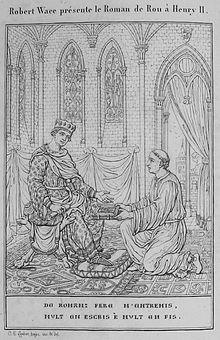- Wace
-
Wace (c. 1115 – c. 1183) was a Norman poet, who was born in Jersey and brought up in mainland Normandy (he tells us in the Roman de Rou that he was taken as a child to Caen), ending his career as Canon of Bayeux.
Contents
Life
All that is known of Wace's life comes from autobiographical references in his poems. He neglected to mention his birthdate; sometime between 1090 and 1110 is the most commonly accepted year of his birth.
The name Wace, used in Jersey until the 16th century, appears to have been his only name; surnames were not universally used at that time.
It is speculated that he may have been of aristocratic origin, as he was sent to Caen to be educated, which would have been virtually impossible for most. His detailed writing on maritime matters may have stemmed from his island upbringing.
Around 1130 Wace returned to Caen and took ecclesiatical work, possibly as a teacher.[1]
Works
His extant works include the Roman de Brut, a verse history of Britain, the Roman de Rou, a verse history of the Dukes of Normandy, and other works in verse, including the Lives of Saint Margaret and Saint Nicholas.
Roman de Brut
Roman de Brut (c. 1155) was based on the Historia Regnum Britanniae of Geoffrey of Monmouth. It cannot be regarded as a history in any modern sense, although Wace often distinguishes between what he knows and what he does not know, or has been unable to find out. Wace narrates the founding of Britain by Brutus of Troy to the end of the legendary British history created by Geoffrey of Monmouth. The popularity of this work is explained by the new accessibility to a wider public of the Arthur legend in a vernacular language. In the midst of the Arthurian section of the text, Wace was the first to mention the legend of King Arthur's Round Table and the first to ascribe the name Excalibur to Arthur's sword, although on the whole he adds only minor details to Geoffrey's text.
The Roman de Brut became the basis, in turn, for Layamon's Brut, an alliterative Middle English poem, and Piers Langtoft's Chronicle. Historian Matthew Bennett, in an article entitled "Wace and warfare," has pointed out that Wace clearly had a good understanding of contemporary warfare, and that the details of military operations he invents to flesh out his accounts of pseudo-historical conflicts can therefore be of value in understanding the generalities of warfare in Wace's own time.[2]
Roman de Rou
His later work, the Roman de Rou, was, according to Layamon, commissioned by King Henry II of England. A large part of the Roman de Rou is devoted to William the Conqueror and the Norman Conquest. Wace's reference to oral tradition within his own family suggests that his account of the preparations for the Conquest and of the Battle of Hastings may have been reliant not only on documentary evidence but also on eyewitness testimony from close relations—though no eyewitnesses would have been still alive when he began work on the text. The Roman de Rou also includes a mention of the appearance of Halley's Comet. The relative lack of popularity of the Roman de Rou may reflect the loss of interest in the history of the Duchy of Normandy following the incorporation of continental Normandy into the kingdom of France in 1204.
Language
The Anglo-Norman language Wace wrote in is variously regarded as a dialect of the Norman language, a dialect of Old French, or specifically the precursor of Jèrriais. Writers in Jersey have looked on Wace as the founder of Jersey literature, and Jèrriais is sometimes referred to as the language of Wace although the poet himself predated the development of Jèrriais as a literary language. Wace is the earliest known Jersey writer.
Although the name Robert has been ascribed to Wace, this is a tradition resting on little evidence. It is generally believed nowadays that Wace only had one name. As a clerc lisant, he was proud of his title of Maistre (master) and is consequently sometimes referred to as Maistre Wace.
There is a granite memorial stone to Wace built into the side of the States Building in Jersey's Royal Square. This includes a quote from the Roman de Rou that expresses the poet's pride in his place of birth:
- Jo di e dirai ke jo sui
- Wace de l’isle de Gersui
Modern Jèrriais:
- J'dis et dithai qu'jé sis
- Wace dé l'Île dé Jèrri
Modern French:
- Je dis et dirai que je suis
- Wace de l'île de Jersey
English:
- I say and will say that I am
- Wace from the Island of Jersey
See also
Notes
- ^ Maistre Wace
- ^ Bennett, "Wace and warfare"
References
- Bennett, Matthew (1988). "Wace and Warfare". Anglo-Norman Studies 11: 37–57.
- Charles Foulon, "Wace" in Arthurian Literature in the Middle Ages, Roger S. Loomis (ed.). Clarendon Press: Oxford University. 1959. ISBN 0-19-811588-1
- Wace, Roman de Brut, ed. I. Arnold, 2 vols., Paris, 1938-1940.
- Weiss, Judith, Wace's Roman de Brut. A History of the British. Text and Translation, Exeter, 2006.
- Arnold, I., and Pelan, M., La partie arthurienne du Roman de Brut, Paris, 1962.
- Wace, Roman de Rou, ed. J. Holden, 3 vols. Paris, 1970-1973.
External links
Categories:- 1110s births
- 1180s deaths
- Anglo-Normans
- Anglo-Norman literature
- Writers of Arthurian literature
- Jersey writers
- Normans
- Norman-language poets
Wikimedia Foundation. 2010.


